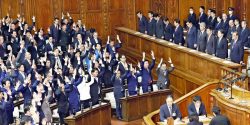- Yomiuri Editorial
- Economic security law
Protect industry, technology through public-private cooperation
11:55 JST, May 12, 2022
The management of infrastructure and supply chains of critical goods that private companies are responsible for are closely linked to national security.
The public and private sectors must work together to protect industries and technologies that are indispensable for stable improvement of people’s lives.
A bill to promote economic security, one of the centerpiece policies of the administration of Prime Minister Fumio Kishida, was passed into law by a majority vote with support from both ruling and opposition parties. The law is designed to strengthen important industrial bases and establish a system to foster advanced technologies.
Countries are competing to acquire strategic materials such as semiconductors, and advanced technologies such as artificial intelligence. Companies and hospitals, among other entities, have been hit by a spate of cyber-attacks. It is necessary to strengthen the government’s involvement in economic security.
The law focuses mainly on enhancing supply chains for important materials and conducting prior screenings to ensure the security of core infrastructure facilities.
Semiconductors are essential for industrial products, but the global economic recovery from the coronavirus pandemic has led to competition worldwide to procure them. Under the new legal framework, the government will be able to provide subsidies to companies and stockpile important materials in order to ensure stable supplies of key goods, including pharmaceuticals.
It is vital to accurately understand the supply network and supply-demand situation to prepare for unforeseen circumstances.
In terms of infrastructure facilities, a system of prior screenings will be established that requires business operators in 14 sectors, including electricity, railways and finance, to notify the government in advance when they install critical facilities. This is to prevent cyber-attackers from disrupting operations and extracting information, among other issues.
The government will examine the risk of attack and, if necessary, may issue a recommendation or order for correction. Penalties of up to two years in prison will be imposed if companies do not comply with such instructions.
It is difficult for companies to take sufficient measures against cyber-attacks on their own. It is hoped that the government will advise businesses about specific measures they can implement to protect themselves, through information exchanges with other countries.
The criteria for designating facilities and businesses subject to the screenings will be set by the government in future government and ministry ordinances, the details of which have not been made public. The business community is calling for the criteria to be limited to those that are absolutely necessary so as not to lead to excessive restrictions on business activities.
During Diet deliberations, opposition parties expressed concerns that the decision-making process would become opaque. In response, the government indicated that it intends to create basic guidelines for the formulation of ordinances after listening to the opinions of experts and others.
It cannot be realistic to disclose all security-related regulations. However, if the standards and approach to screenings are ambiguous and companies cannot predict what will happen, economic activities could be hampered. It is essential for the government to clearly define the rules and publicize the information thoroughly.
(From The Yomiuri Shimbun, May 12, 2022)
Top Articles in Editorial & Columns
-

40 Million Foreign Visitors to Japan: Urgent Measures Should Be Implemented to Tackle Overtourism
-

University of Tokyo Professor Arrested: Serious Lack of Ethical Sense, Failure of Institutional Governance
-

Policy Measures on Foreign Nationals: How Should Stricter Regulations and Coexistence Be Balanced?
-

China Provoked Takaichi into Risky Move of Dissolving House of Representatives, But It’s a Gamble She Just Might Win
-

PM Takaichi Should Help Young Japanese Break Seniority Barrier to Vitalize Politics
JN ACCESS RANKING
-

Japan Institute to Use Domestic Commercial Optical Lattice Clock to Set Japan Standard Time
-

Israeli Ambassador to Japan Speaks about Japan’s Role in the Reconstruction of Gaza
-

Man Infected with Measles May Have Come in Contact with Many People in Tokyo, Went to Store, Restaurant Around When Symptoms Emerged
-

Prudential Life Insurance Plans to Fully Compensate for Damages Caused by Fraudulent Actions Without Waiting for Third-Party Committee Review
-

Woman with Measles Visited Hospital in Tokyo Multiple Times Before Being Diagnosed with Disease




















